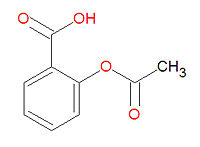Aspirin: Difference between revisions
Jump to navigation
Jump to search

imported>Robert Badgett No edit summary |
imported>David E. Volk (structure picture, a bit of text) |
||
| Line 1: | Line 1: | ||
{{subpages}} | {{subpages}} | ||
'''Aspirin''', or '''acetylsalicylic acid,''' is the "prototypical analgesic used in the treatment of mild to moderate [[pain]]. It has anti-inflammatory and antipyretic properties and acts as an inhibitor of [[cyclooxygenase]] which results in the inhibition of the biosynthesis of [[prostaglandin]]s. Aspirin also inhibits [[platelet]] aggregation and is used in the prevention of arterial and venous [[thrombosis]]."<ref>{{MeSH}}</ref> | [[Image:Aspirin structure.jpg|right|thumb|200px|{{#ifexist:Template:Aspirin structure.jpg/credit|{{Aspirin structure.jpg/credit}}<br/>|}}Aspirin.]] | ||
'''Aspirin''', or '''acetylsalicylic acid,''' is the "prototypical analgesic used in the treatment of mild to moderate [[pain]]. It has anti-inflammatory and antipyretic properties and acts as an inhibitor of [[cyclooxygenase]] which results in the inhibition of the biosynthesis of [[prostaglandin]]s. Specifically, it inactivates the enzyme [[prostaglandin synthase]] by acetylating its terminal amino group. Aspirin also inhibits [[platelet]] aggregation and is used in the prevention of arterial and venous [[thrombosis]]."<ref>{{MeSH}}</ref> | |||
Aspirin resistance may cause susceptibility to cardiovascular morbidity.<ref>Krasopoulos, George et al. 2008. “Aspirin "resistance" and risk of cardiovascular morbidity: systematic review and meta-analysis.” BMJ 336(7637):195-198. http://www.bmj.com/cgi/content/full/336/7637/195</ref> | Aspirin resistance may cause susceptibility to cardiovascular morbidity.<ref>Krasopoulos, George et al. 2008. “Aspirin "resistance" and risk of cardiovascular morbidity: systematic review and meta-analysis.” BMJ 336(7637):195-198. http://www.bmj.com/cgi/content/full/336/7637/195</ref> | ||
Revision as of 10:41, 25 January 2008
Aspirin, or acetylsalicylic acid, is the "prototypical analgesic used in the treatment of mild to moderate pain. It has anti-inflammatory and antipyretic properties and acts as an inhibitor of cyclooxygenase which results in the inhibition of the biosynthesis of prostaglandins. Specifically, it inactivates the enzyme prostaglandin synthase by acetylating its terminal amino group. Aspirin also inhibits platelet aggregation and is used in the prevention of arterial and venous thrombosis."[1]
Aspirin resistance may cause susceptibility to cardiovascular morbidity.[2]
References
- ↑ Anonymous (2024), Aspirin (English). Medical Subject Headings. U.S. National Library of Medicine.
- ↑ Krasopoulos, George et al. 2008. “Aspirin "resistance" and risk of cardiovascular morbidity: systematic review and meta-analysis.” BMJ 336(7637):195-198. http://www.bmj.com/cgi/content/full/336/7637/195
